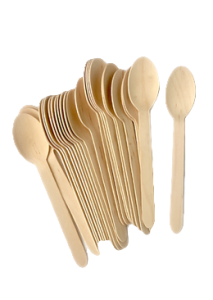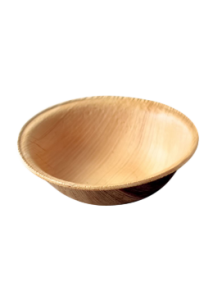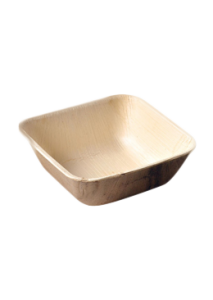Leaf Plus, an idea that sparked during a nostalgic conversation about “tapari momo” among old college friends is a very modern approach to traditional techniques. Using leaves to make bowls and plates is a common tradition in Nepalese culture and it is also the ‘go-to’ serving plate for street foods. However, the Leaf Plus team went an extra mile and made dishware out of leaves for an efficient, eco friendly, and sustainable way for consuming food.
Learn more about this innovative approach of making dishware out of discarded Areca leaves in this interview with the co-founders of Leaf Plus, Mr. Kobit Singh Baniya and Swaviman Acharya.
How did you come up with the concept for “Leaf Plus”?
I, Bidhan, and Kobit met at Goldengate alumni association. While having momos in a traditional leaf plate (tapari) outside the college and having a serious discussion about our future, the idea of starting this company clicked. While discussing about the product we realized that taparis are stitched together using bamboo sticks which can be injurious if one mistakenly swallows it. The traditional plate does not hold the liquid properly and is less attractive in appearance.
We decided to explore the concept of making better leaf plates for adding value to ‘Taparis’ we use. So, we researched on the machines and various kinds of leaves such as pine, palm, corn, and leaves of areca tree that can be used to improvise the plates. We found that the areca tree shed out leaves which can be incredibly useful for making the leaf plate.
Moreover, we also went to India to analyze the market of leaf plates as it is widely used there. We partnered with Hari Dahal who is an agro-preneur from Jhapa. He provided us information on the availability, strength and possibility of collection of the areca leaves in Jhapa. Finally, we registered our company in June 2017 and came into operation in December 2017.
Can you tell us about your products?
We started with five varieties of plates from Areca leaves. We are currently focusing on expansion, to producing 16 varieties including the spoon. We are soon launching other products like soup bowls. We also want to produce glass, forks, knives and straws. Right now we are in the research stage.
What is your team strength?
We are four core members- Kobit Singh Baniya, Bidhan Pokhrel, Swaviman Acharya, and Hari Dahal. We started out as a research centre with one machine and three full time leaf collectors. We have gradually grown and now have manufacturing team, collection team and farmers who supply us the leaves. We employ one manager and three employees for each operating machine whose job is to wash the leaves, machining, and packaging. Besides these people we also have group of women collect leaves from farmers and store it in a hygienic manner.
How did you manage initial investment for the startup?
We were determined toward establishing our own company, so we initially started with our personal investment. Considering the need for organizational growth for infrastructure development and purchasing the machines, we took a professional loan. We also had some goodwill investors who pitched although it was very nominal.
What kind social change do you see your venture bringing in?
The immediate change that we see is minimizing the use of plastic by providing eco-friendly options for consuming food items. The other part is on the productivity of the farm. There are various other plants such as palm, black pepper which are grown beneath the areca tree. The shedding of leaves obstruct the growth of these trees. The farmers now collect the leaves and supply us thereby increasing the yield from other trees as well.
We also focus on women empowerment by employing women in the factory and providing them with training, machines, and helping with making quality products.
What are the challenges you’ve been facing with your startup?
We registered our venture in Company Registrar Office as a company as well as a small scale industry and we ran into a legal problem with its certification. Another problem we faced right at the initial stage was when we approached the farmers, they did not trust us. In their perception the leaves were useless. They didn’t know that the leaves they were wasting could be used to make plates. Also the money they could generate through leave collection was ‘small money’ for them. To tackle this issue we did awareness campaigns, collaborated with farmers who were willing to collect leaves and paid them a certain amount of money for building trust. We also set up a store house for collecting and storing the leaves hygienically. It required upfront investments on our part. Since we were from engineering background and had no experience of manufacturing we learned a lot of the job about quality, hygiene and production.
Other challenge is the price of the product. People find our product to be expensive compared to disposable plastic products available in the market.
How did you market your product in the initial stage?
A very interesting thing that happened for us was that we got good attention from market because publication houses like Seto Pati, Republica, Himalayan Times, Kathmandu Post, and SBS Australia covered us. We got such widespread publicity that we started receiving sales queries right at the initial phase of Leaf Plus.
What are your future plans?
Our immediate focus is growth and expansion. We have further strengthened and expanded our manufacturing unit in Jhapa due to easy availability of raw materials. 30 million leaves shed off each year which can be used for manufacturing around 16 million leaf plates. Morang and Sunsari also have a lot of Areca leaves and therefore we see a huge potential for production in those places.
We are also trying out new products like a framed map of Nepal made out of Areca leaves, hat and printed plates that can be sold as a souvenir. We see ourselves exporting our product in near future.
For more information about Leaf Plus, click here and check out their Facebook profile here for more updates.
Originally published on blincventures.com










